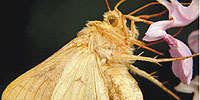I don’t know about other countries, or other Rwandan towns or villages, but it looks like Kigali has been invaded, captured and colonised by butterflies.


I don’t know about other countries, or other Rwandan towns or villages, but it looks like Kigali has been invaded, captured and colonised by butterflies. No one would be complaining if these colonialists were the lovely variety, those with patterns of beautiful colours on their wings. Unfortunately, these are an ugly breed, the hideous type that let off ugly, maybe even poisonous, powder when they touch anything. Everybody is bewildered as to what attracted them to this emerging city of the highlands. What exactly do they portend?And it’s sad that I should be asking. In the good old days, I could clearly see the message in the movement of the tiniest creature. For, don’t be deceived, no creature embarks on any kind of journey for the simple reason of migratory pleasure. All creatures, especially the tiny ones, have a reason they are moving in their big families. Their sharp instinct and sense of surrounding will usually have warned them of some impending danger. Alternatively, they’ll be on their way to cause havoc wherever they go. Are these butterflies running away from something or are they coming to cause havoc in Kigali?At the slopes of Mount Muhabura where I was born and bred and in whatever forests of Uganda and Congo (today’s DRC) that I migrated to, I’d learnt to blend in with nature. That’s to say, my instincts had been so well honed as to be as sharp as those of the creatures of the wild. You know, it’s a rough world out there in the wild. So, my comrades-in-arms, who were these bosom buddies of the wild – these crawlers, slither-ers, runners and flyers – had sort of handed me their simple survival kit: "When you see anybody/thing moving, move!” And so I competed with them and became an expert at what any persistent migratory exercise portended. For instance, it’s the 1950s and you’re playing with your friends in one of the many deep and wide gullies that ran all the way from Mt Muhabura to Lake Burera.....But first, an explanation of these gullies. If you’ve been to visit my cousins, the gorillas, you’ve seen a gully that runs under the bridge as you drive, or are driven, to the tourist post in Kinigi, the small RDB office. That gully over which you pass is the type of gully I’m talking about, though that’s a small one. We used to frequent the wide, deep ones for purposes of their convenience. Their convenience lay at the bottom of the gully in the way the sun never reached it. Even when it was very hot, we were able to play there because the bottom was covered in the shadows cast by its own walls. That’s how it became an ideal playground.But that was not all. For being deep down, the bottom was also shielded from the eyes of passers-by, which meant that you could make it your convenience ‘room’. When you were answering the call of nature, you could not be seen by passers-by. So, we young ruffians had compartmentalised the gullies into different ‘operational’ zones.....And that’s how butterflies, insects and animals come in. You’d be playing, for instance, and then you’d see all creatures scurry away suddenly, even when your noisy presence had not bothered them. When you saw something like that, you didn’t start to look around you in amazement. You took to your heels and tried to outdo the ants, rats, snakes, antelopes and even rabbits in racing to safety.Why? It meant there was a torrent of rainwater coming. As I said, these gullies originated high up in Mt Muhabura. They’d been formed by rain water from the mountaintop. You see, rain that fell on Muhabura mountaintop was not the same as rain that fell down bellow, in our villages. Worse, you could not tell that it was raining on the mountaintop because the clouds that’d formed before rain fell were not visible to you. Down below, you only saw water gushing down and taking with it whatever was in its way. It could be your family’s herd of cattle because, foolish things, domestic animals do not share this instinct. They’ll only depend on you to have been attentive to the warning of the wild animals, the negligence of which often resulted in your bottom turning into minced meat, thanks to your old man’s spirited flogging.But, as I said, these creatures can be the originators of danger too. Suppose, for instance, these rains are not able to kill off the wings of these butterflies – which they’d accompany – before they morph into some kind of caterpillars. In their big numbers if they take to feeding to their fill, it’ll be bye to beans, peas, cabbage, potatoes, cassava, bananas and other food crops that are vital for our sustenance. With nowhere to scrounge for leftovers of these creatures, imagine Kigali urbanites going to a supermarket, an alimentation or an open market and "nary a drop” to eat. Even an impassioned walk-to-work picketing will not impress these satiated caterpillars! Let’s only hope that rainwater will wash away this soaring squall.




